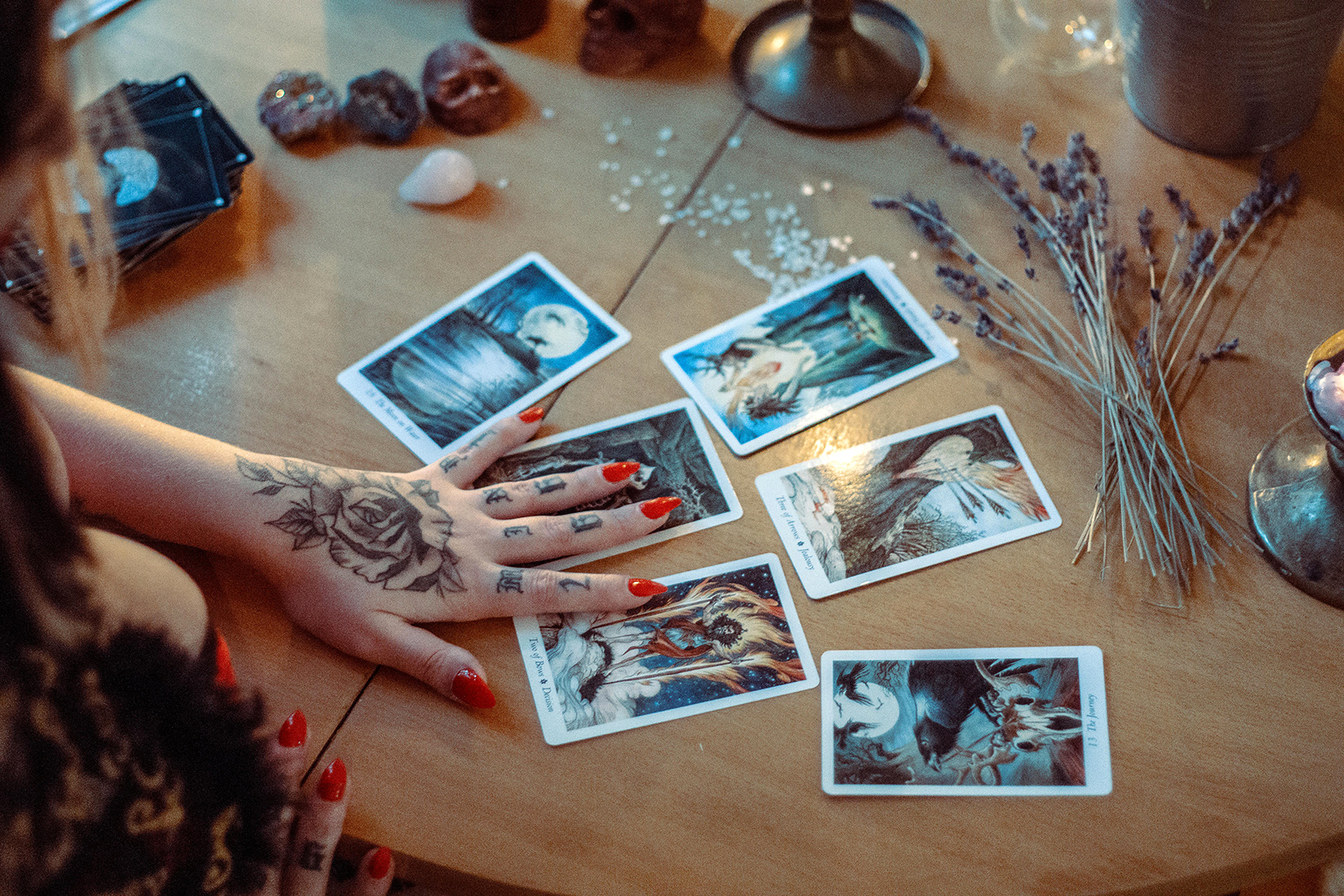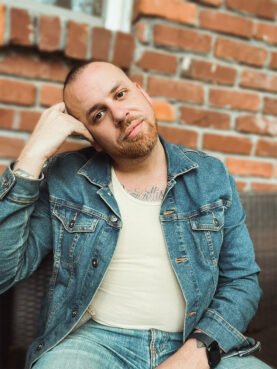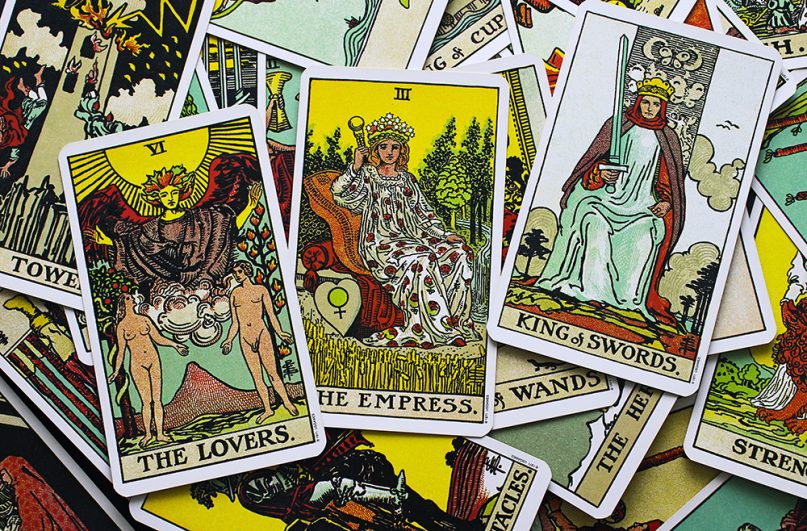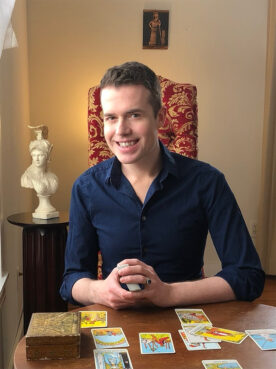
(RNS) — In recent years, tarot cards and readings have become increasingly mainstream. According to a survey from the Pew Research Center released in May, about 1 in 10 Americans said they seek tarot readings at least annually.
When it comes to religious affiliation, the Pew study identified the demographic most apt to use tarot cards as observing “nothing in particular — 16% in that category said they consulted tarot cards once or twice a year. Meanwhile, those least likely to use tarot cards were white evangelicals (4% consult cards once or twice a year).
Three tarot practitioners who left conservative Christian upbringings told RNS using tarot cards helped them reimagine their spirituality.
Tarot practitioners Kevin Garcia and Elliot Adam grew up in evangelical communities they since left, making them what some might call exvangelicals. Charlie Claire Burgess grew up in a conservative Methodist church and said that although the denomination was not considered evangelical, they felt they could commiserate with much of the exvangelical experience.

Kevin Garcia. (Courtesy photo)
Garcia, now based in Atlanta, described themself as being “very devout” growing up.
“(My) mother was the worship leader, uncle was the pastor, we were in church, you know, three to four times a week depending on the season,” Garcia said.
By the time they were 25 years old and serving as a missionary, they decided to leave their evangelical spaces.
“When I came out of the closet, I got kicked out,” Garcia, now 35, said. “And from there I started piecing my life together — the kind of life I wanted.”
For each of the practitioners interviewed, their discovery and use of tarot was closely linked to their leaving conservative church spaces. Garcia’s experience with tarot was also connected to their coming out.
“They told me that the devil was lurking in all of these places, like being gay and in tarot,” Garcia said. “But when I came out, I was like – oh, no, this is actually a good thing. I’m more happy, I’m more connected to love.”
They started to believe spiritual practices like tarot couldn’t be as bad as they were taught to believe either, Garcia said. Reading cards and guidebooks, they began to see tarot as an empowering tool for discernment, or a mirror of the thoughts and feelings one holds inside.
Garcia now uses tarot as a tool for spiritual direction in their coaching business and said it helps people slow down, get introspective and confirm what they already hold within themselves.
According to the Pew study, 33% of American LGBT adults surveyed said they consult tarot cards – making them three times as likely as U.S. adults overall to do so. Also, 21% of LGBT people surveyed say that when they make major life decisions, they rely at least a little on what they’ve learned from astrology or a horoscope, tarot cards or a fortune teller, while 5% of U.S. adults overall said they rely a little on what they have learned (1% overall said they relied on such information “a lot” for major decisions), indicating queer people may tend to take the readings more seriously.

(Photo by Manik Roy/Unsplash/Creative Commons)
Garcia said many people who come to them for tarot readings are queer.
“I think that a lot of LGBTQ people are drawn to tarot because we’ve been deprived of any sort of spirituality or belief system,” Burgess said. “When you’ve been kicked out of religion, and when all that religion has ever done is tell you that you’re wrong and evil and going to hell, you don’t usually want to go out and find another religion to belong to. You get kind of skeptical of religion. I think that one thing that tarot and astrology offer to people like me is mostly nondogmatic, sort of self-guided, choose-your-own-adventure spiritual inquiry.”
Tarot offered Adam, who knew he was gay from a young age, a homecoming that he felt evangelicalism never could, he explained. He, too, had an uncle who was a minister.
“(He was) very religious, very much involved in the anti-abortion movement,” Adam, 45, said. “I remember carrying signs around when I was, like, 8 years old in front of judges’ houses and things like that. So I was definitely indoctrinated in that sort of worldview.”
Adam left his church when he was 16 — the same age he discovered tarot. His mother’s boyfriend at the time had a deck of tarot cards up in the attic, and when Adam found them, he was captivated. He quickly began practicing reading the cards, he said. Eventually, one of his more conservative family members found his cards and threw them away.

Elliot Adam. (Courtesy photo)
Not long after, his older brother, who also had experience with tarot readers, bought him a new deck. Adam then became connected with a woman who ran a hippie tea shop in town, and she let him do readings for people out of her space, launching the beginning of Adam’s career with tarot, he said.
Adam, who is currently in England, has now written two books about tarot, and his website, Elliot Oracle, offers meanings of each tarot card. When he gives someone a tarot reading, he’s simply reading the symbols of the cards, he added.
“I don’t have mind powers,” Adam said. “I can’t read their brain. But as I’m talking through these symbols, they are striking chords with what’s going on with people on such a profound and deep level.”
Like Adam, Burgess’ first encounter with tarot happened when they were a teenager. They got a deck of cards and started using them in secret. After a while, though, because they were taught tarot was something evil, using them began to feel too scary.
“I freaked myself out and threw my tarot deck into a dumpster behind a mall,” Burgess said.
Burgess, 39, who now resides in Portland, Oregon, was rebellious as a teenager, they said, but their parents made them go to church every Sunday starting in elementary school.

Charlie Claire Burgess. (Courtesy photo)
“I had to go to anti-sex camp basically as part of the confirmation process, where I was taught that homosexuality is a sin, sex before marriage is a sin, masturbation is a sin, all of those,” they said. “And they didn’t even mention trans people.”
These rules and restrictions felt wrong to Burgess, even at a young age. They remembered thinking, “The God that they’re preaching about is not the God that I believe in.” When the time came to leave their church for good, they “never looked back,” they said.
They came back to tarot in their late 20s as a part of a larger spiritual awakening that coincided with their discovery of their gender identity and sexuality. “There’s something about using tarot that can help you know yourself better,” they said.
While Burgess doesn’t offer professional one-on-one readings with people, they have taught classes on tarot, written a book on it and have created tarot decks through their business, The Word Witch Tarot.
Ultimately, each practitioner sees tarot as a tool that helps people understand themselves more fully. And for people who have left conservative Christian spaces, it is also a tool in which self-discovery can happen in a way that offers personal agency, which feels new and refreshing, they said.
These days, each of these practitioners identifies their spirituality in different ways. Garcia still sees Jesus as an important faith teacher, but also incorporates alternative elements such as ancestor veneration and yoga. They define themselves as “spiritual but not dogmatic or religious.”
Adam identifies as pagan and connects the most with the goddess Athena, he said.
Burgess said, “I don’t subscribe to any organized religion, and my spirituality is inherently queer — by which I mean expansive, curious, questioning, relational, anti-dogmatic, constantly transforming, and devoted to the care and liberation of all people.”
